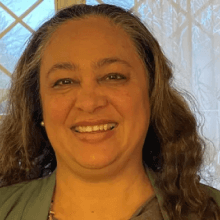INTERESTED IN ONCE-MONTHLY TREATMENT? LEARN MORE
EspañolInterested in a once-monthly treatment option?
Learn moreInterested in connecting with other caregivers?
Learn more about Connected By HopeRethinking the Possibilities: Insights From a Psych NP Living With Schizophrenia

Published November 7, 2022
I became a psychiatric mental health nurse practitioner (PMHNP) for two reasons: the first was to heal myself, as I’m living with schizophrenia, and the second was to heal others. I wanted to make sense of my experience and become someone who was not available to me early on in my recovery—a person living successfully with this illness.
Most people don’t have experience with schizophrenia until they or a loved one is diagnosed, and their only reference points may be from media or entertainment industry portrayals. Often, newly diagnosed adults and their families must address their own biases and misconceptions as much as they struggle with the stigma and discrimination they may face from others.
I was deeply fortunate to have a strong support team, including peer support groups, my friends and family, and my clinician, who helped me see not just where I was in that current moment, but what I could achieve and the person I could become. In this way, they helped me break down the stigma of my diagnosis.
If you had asked me early in my journey if I would be a clinician or law student, I would have said, “Yeah, right—you’re kidding me.” At that point, I was simply struggling to survive. Nevertheless, with the right treatment plan in place, my support team encouraged me to give back to my community, join peer and advocacy groups, and continue my education as the path forward toward achieving my goals.
Recognizing the potential beyond the diagnosis
I approach my clinical encounters with adult patients with a strengths-oriented framework, aiming to treat the whole person and not simply assess the patient’s disease or focus on their deficits. Together, the patient and I identify goals and aspirations, highlighting what they can achieve by focusing on how we can move forward and recognizing the potential in the patient beyond the diagnosis.
Further, my dual identity both as a patient with schizophrenia and a mental health clinician helps me break down the patient-provider hierarchy and serve as an example that it is possible to live productively with this illness. I often share my story with other patients to instill hope. There is usually a path forward despite what someone may immediately think or feel after being newly diagnosed.
Schizophrenia is a chronic condition, and while we cannot yet prevent it from developing, we can mitigate its impact with sustained treatment. However, many adults living with schizophrenia, including myself, reach a period of temporary stability and stop taking their medication as prescribed. It sometimes takes a near-second episode to finally register that this illness is a lifelong condition requiring ongoing care. This makes it even more critical for adults with schizophrenia to understand that medication adherence could improve the likelihood of symptom management and the recovery journey.
Bridging the lived and professional perspectives
When I started working in mental health, the common assumption was that long-acting injectable (LAI) antipsychotics were for adults who had been in the mental health system for a long time, having failed multiple treatment modalities. However, evidence and research suggest this might not be the case, as recent guidelines and guidance have expanded the use of LAIs in appropriate patients.
As such, education on LAIs is a crucial component of schizophrenia management and care. Clinicians and adults with lived experience need the education to overcome the stigma or misperceptions frequently associated with LAI interventions. It’s essential to listen to adult patients, letting them ask questions about treatment options and working to answer and address those questions. I often draw parallels to other medical fields when discussing LAIs and find patients curious about administration, treatment duration, and how they might differ from oral medication. When seeing patients and determining who may be a good candidate for or benefit from an LAI, it is important to consider patient preference, caregiver preference, challenges with adherence, and whether it’s viable for a patient to come into the office once a month or more often.
As a clinician, our practice setting sometimes dictates our prescribing habits. For example, as a PMHNP, nursing education has no residency infrastructure, so you often develop your practice preferences and norms on the job. If your first few workplaces use LAIs, you will learn how to use them, but if they don’t, you will likely be less familiar with the formulations, administration, payment instructions, and fulfillment processes. Opportunities for continued education on all viable treatment options are crucial, especially for nurses, given the different training and education modalities. For clinicians, like PMHNPs, and adults with lived experience, it often boils down to education to demystify treatment options, like LAIs, to empower the shared decision-making between patient and provider.
I became a clinician not only to make sense of my experience and understand what I would need to do to cope with my illness but also to pay it forward and help others going through similar journeys. Schizophrenia requires lifelong management, but achieving your goals is possible with knowledge, empowerment, and the right support system.
For more perspectives from psychiatric nurse practitioners, visit the Peerspectives series on TalkingLAIs.com
This article reflects my own experience and opinions and was developed in joint collaboration by Janssen Pharmaceuticals, Inc., and myself. I have been paid an honorarium for my time.
cp-346215v1
Recommended reading:

A Broadway Performer’s Journey With Schizophrenia
Meera was at the peak of her Broadway career when she was diagnosed with schizophrenia. Now, 25 years later, as she looks back at her journey and how her perspectives on schizophrenia, treatment...